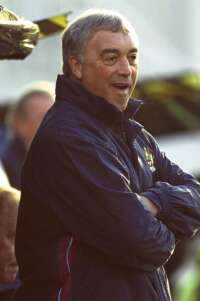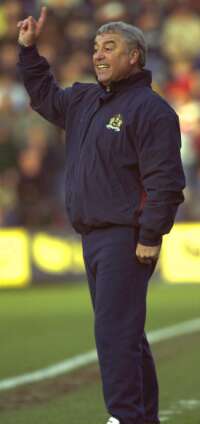On the morning of the game the following article by Michael Walker was published in the Guardian, from an interview with Stan Ternent and a look back at Burnley's history.
Ternent close to matching the great Clarets
Burnley's manager is on top of the First Division and ready to take on Manchester City
By Michael Walker
|
The intention was to have a conversation with the manager Stan Ternent about Burnley as they are now and how they will be in three days' time, a club of 2002 rather than 1962. The intention was to talk about the future. The intention fell at the first. History and Burnley go together like mother and son; Ternent has a role akin to an umbilical cord.
The good intention hit the floor the moment the records were checked to reveal that the last time Burnley were the best team in England, in 1960, they clinched their title at Maine Road. You can get the video in the club shop: When We Were Kings.
Today at noon Burnley play Manchester City there again, with Burnley first in the Nationwide League, City second - a 34,000 sell-out. Burnley are four points clear so they will remain top for new year regardless of the result. Birmingham City's Steve Bruce, for one, has said the rest are already fighting over the second automatic promotion spot.
Thus Burnley's modern history - of success - has begun to take shape. Ternent was a Sunderland-supporting schoolboy in Gateshead that May day in 1960 when Harry Potts's side of Jimmy Adamson, John Connelly and Jimmy McIlroy pipped Wolves by a point. But two years later, as a 16-year-old apprentice, he was one of them. Burnley were going for the Double, but finished second to Ipswich in the league and lost to Spurs in the FA Cup final. Nevertheless, the claret had got into Ternent's blood.
So when, 3 years ago, he was asked to succeed Chris Waddle at Turf Moor, despite having guided Bury into their highest position for 30 years, he dropped down from the First Division to the Second to revive his fallen first club. He knew the scale of the task, because he knew the significance of the history.
"It can be both a burden and an inspiration," Ternent said yesterday. "I'm 55 now and I've known Burnley from the good days. I know what Burnley is about, as a club and as a town. It is amazing how many former players come back and live in the town. I understand that. I understand the history - sometimes it might be easier if I didn't.
"If you've won championships, been in FA Cup finals, been in the European Cup, that's a tall order to follow. In those days Burnley, and Spurs under Bill Nicholson, were the best sides. But I consider it a privilege to manage a club like Burnley. I'd never have thought it could happen when I was a kid here."
But it is happening and so are Burnley. Ternent said his immediate aim on arrival in June 1998 was to stabilise the club, then think about promotion, then stabilise again. So far Burnley are ahead of his agenda. Having come up behind Preston 18 months ago, they finished seventh last season, missing the play-offs by three points. This season they have surged on, losing only five of 25 games. They are 10 games unbeaten; they have won six of the past seven. Suddenly Burnley are looking at the top flight after what will be 26 years away.
|
"Last season we wanted to maintain our First Division status. We achieved that. This season we wanted to establish Burnley as a good First Division side. At the moment we're top, but we know it will get harder because everyone wants to beat you. Injuries and suspensions will be a big part for us because we're not as big as some. But every year we have improved, and financially we're not bad, not as good as some but not as bad as others.
"We're competitive, good enough to be there or thereabouts. Each week that goes by, ambitions change. We'd like to finish in the top six. First or second would be utopia."
Strange to hear this self-confessed "single-minded" and "thick-skinned" pragmatist speaking of utopian ideals, but maybe Burnley does things to Ternent. He has had less joyous times as manager of Blackpool and Hull City. "I'd die happy," he has said of Burnley becoming a Premiership club. Having also been assistant to Steve Coppell when Crystal Palace were promoted to the old First Division in 1989, he knows what it takes to make that final jump. It was Ternent's Palace connection that explained why the then 36-year-old Ian Wright made Burnley his last club for a brief time last year.
"Similar" was his comparison with that Palace promotion team in which Wright played. "We're on track. We're showing championship form. We've strengthened a little since last year, plus the players and I have been together for over two seasons now. They're aware of what's required. They're showing good progression but we will need two or three or four new faces. I'll get those over a period of time."
Although Burnley exist on an average gate of 15,000 - remarkable in a town of 80,000 - Ternent's confidence about acquisitions is based on the one made by his chairman Barry Kilby. Kilby bought Burnley shortly after Ternent had been appointed and under the two the club's turnover has risen to more than £10m. Ternent spent one tenth of that 14 months ago when making Ian Moore the club's record signing.
He was able to do that only because of Kilby's faith in him, ironically in the aftermath of a 6-0 drubbing by Manchester City in his first season. He tendered his resignation. "I knew that it could get worse before it got better when I came but I needed the opportunity to get that right. There was no quick fix. Major surgery was needed. I felt I had to say that to the chairman. I never wanted to leave."
Kilby listened and must be glad today that he did. Burnley at Maine Road in the match of the day and Ternent meeting Kevin Keegan and Arthur Cox again. He played against Keegan for Carlisle United in the 1970s; Cox he served under in his first coaching job in charge of the youth team at Sunderland. There's no escaping history with Stan Ternent and Burnley.


